Mises, Ludwig von. Theory and History: An Interpretation of Social and Economic Evolution
Подождите немного. Документ загружается.

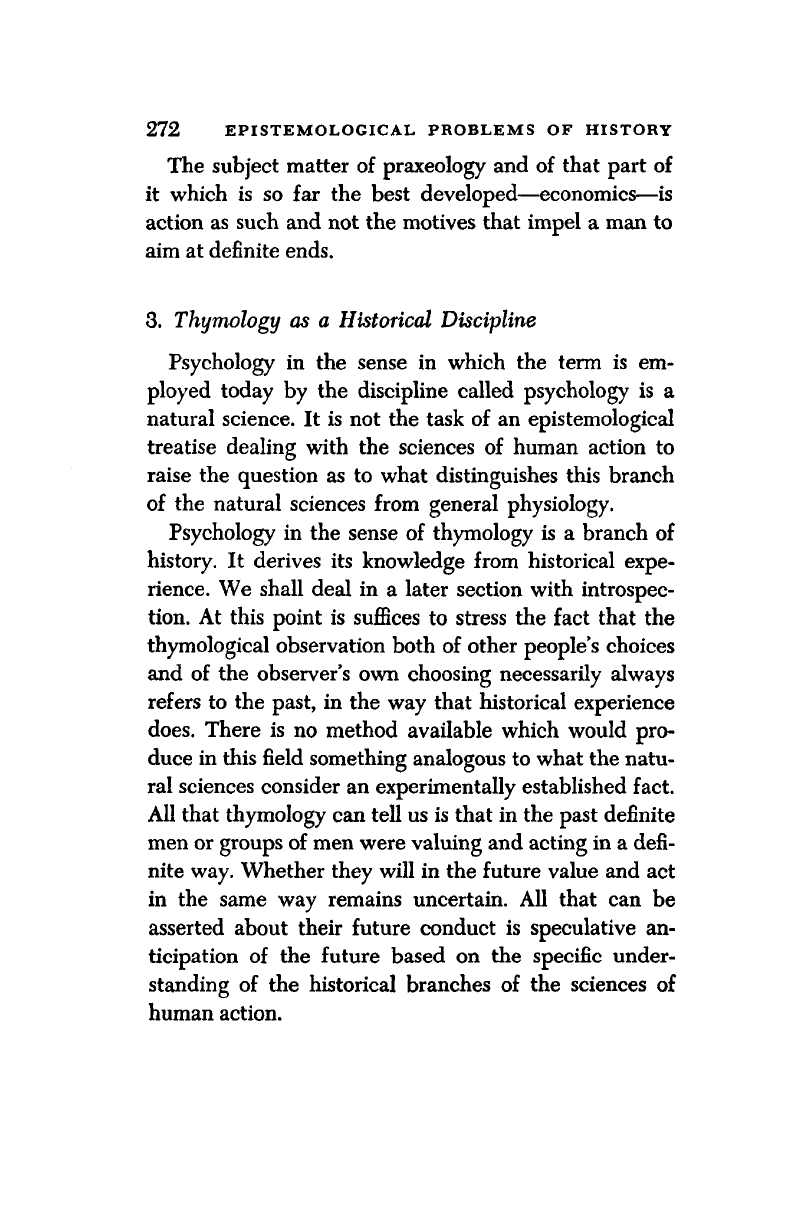
272 EPISTEMOLOGICAL PROBLEMS OF HISTORY
The subject matter of praxeology and of that part of
it which is so far the best developed—economics—is
action as such and not the motives that impel a man to
aim at definite ends.
3.
Thymology as a Historical Discipline
Psychology in the sense in which the term is em-
ployed today by the discipline called psychology is a
natural science. It is not the task of an epistemological
treatise dealing with the sciences of human action to
raise the question as to what distinguishes this branch
of the natural sciences from general physiology.
Psychology in the sense of thymology is a branch of
history. It derives its knowledge from historical expe-
rience. We shall deal in a later section with introspec-
tion. At this point is suffices to stress the fact that the
thymological observation both of other people's choices
and of the observer's own choosing necessarily always
refers to the past, in the way that historical experience
does.
There is no method available which would pro-
duce in this field something analogous to what the natu-
ral sciences consider an experimentally established fact.
All that thymology can tell us is that in the past definite
men or groups of men were valuing and acting in a defi-
nite way. Whether they will in the future value and act
in the same way remains uncertain. All that can be
asserted about their future conduct is speculative an-
ticipation of the future based on the specific under-
standing of the historical branches of the sciences of
human action.
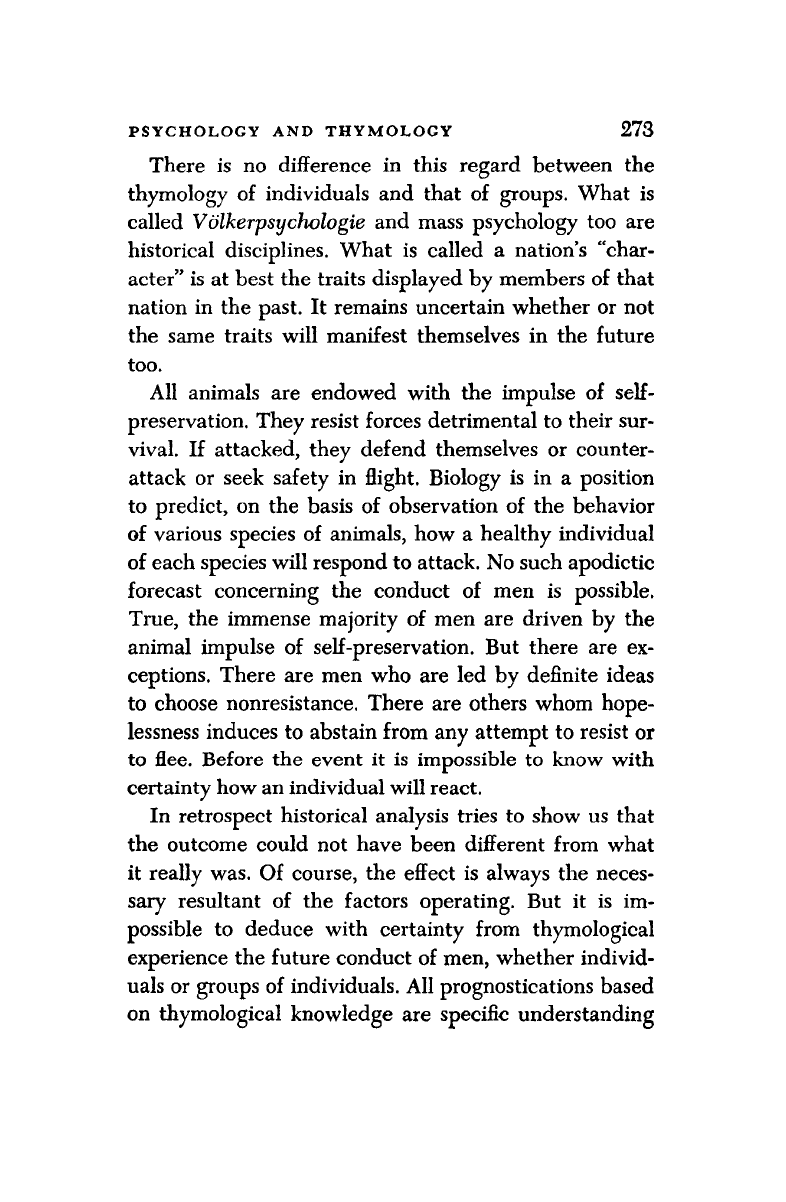
PSYCHOLOGY AND THYMOLOGY 273
There is no difference in this regard between the
thymology of individuals and that of groups. What is
called Volkerpsychologie and mass psychology too are
historical disciplines. What is called a nation's "char-
acter" is at best the traits displayed by members of that
nation in the past. It remains uncertain whether or not
the same traits will manifest themselves in the future
too.
All animals are endowed with the impulse of
self-
preservation. They resist forces detrimental to their sur-
vival. If attacked, they defend themselves or counter-
attack or seek safety in flight. Biology is in a position
to predict, on the basis of observation of the behavior
of various species of animals, how a healthy individual
of each species will respond to attack. No such apodictic
forecast concerning the conduct of men is possible.
True,
the immense majority of men are driven by the
animal impulse of self-preservation. But there are ex-
ceptions. There are men who are led by definite ideas
to choose nonresistance. There are others whom hope-
lessness induces to abstain from any attempt to resist or
to flee. Before the event it is impossible to know with
certainty how an individual will react.
In retrospect historical analysis tries to show us that
the outcome could not have been different from what
it really was. Of course, the effect is always the neces-
sary resultant of the factors operating. But it is im-
possible to deduce with certainty from thymological
experience the future conduct of men, whether individ-
uals or groups of individuals. All prognostications based
on thymological knowledge are specific understanding
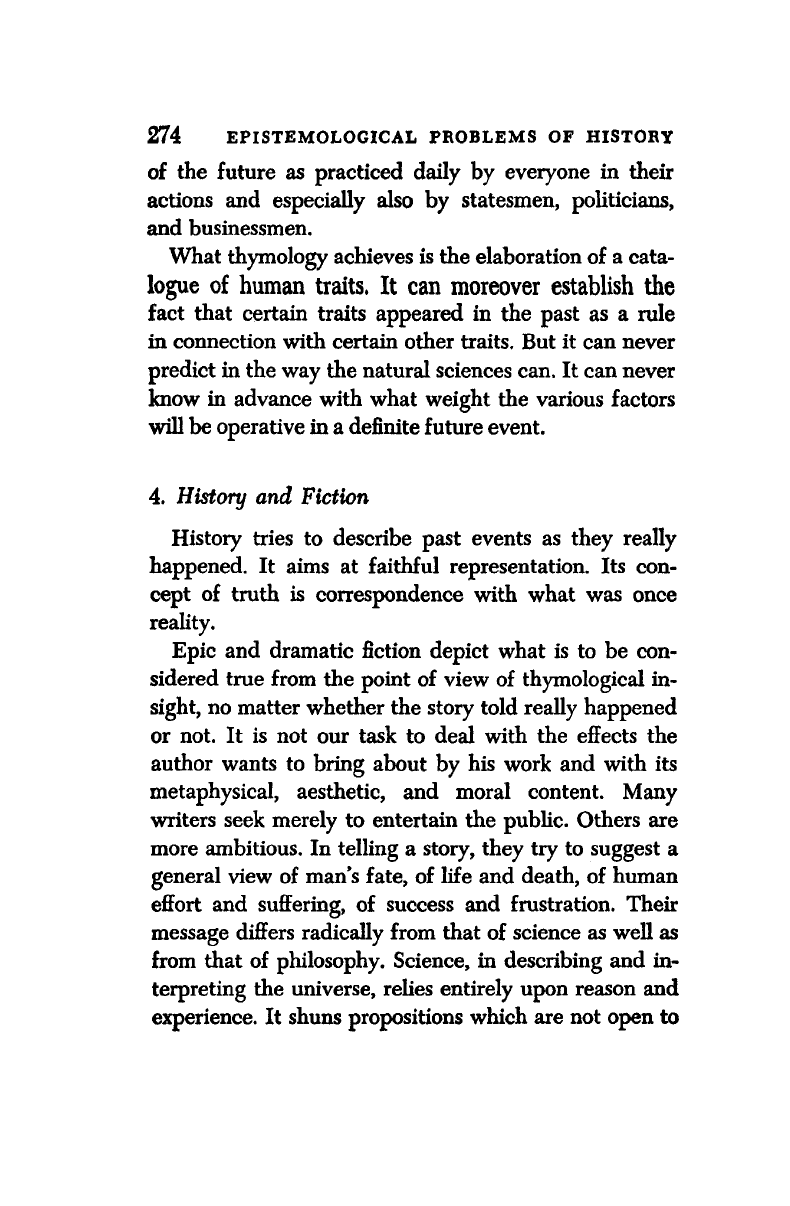
274 EPISTEMOLOGICAL PROBLEMS OF HISTORY
of the future as practiced daily by everyone in their
actions and especially also by statesmen, politicians,
and businessmen.
What thymology achieves is the elaboration of a cata-
logue of human traits. It can moreover establish the
fact that certain traits appeared in the past as a rule
in connection with certain other traits. But it can never
predict in the way the natural sciences can. It can never
know in advance with what weight the various factors
will be operative in a definite future event.
4.
History and Fiction
History tries to describe past events as they really
happened. It aims at faithful representation. Its con-
cept of truth is correspondence with what was once
reality.
Epic and dramatic fiction depict what is to be con-
sidered true from the point of view of thymological in-
sight, no matter whether the story told really happened
or not. It is not our task to deal with the effects the
author wants to bring about by his work and with its
metaphysical, aesthetic, and moral content. Many
writers seek merely to entertain the public. Others are
more ambitious. In telling a story, they try to suggest a
general view of man's fate, of Me and death, of human
effort and suffering, of success and frustration. Their
message differs radically from that of science as well as
from that of philosophy. Science, in describing and in-
terpreting the universe, relies entirely upon reason and
experience. It shuns propositions which are not open to
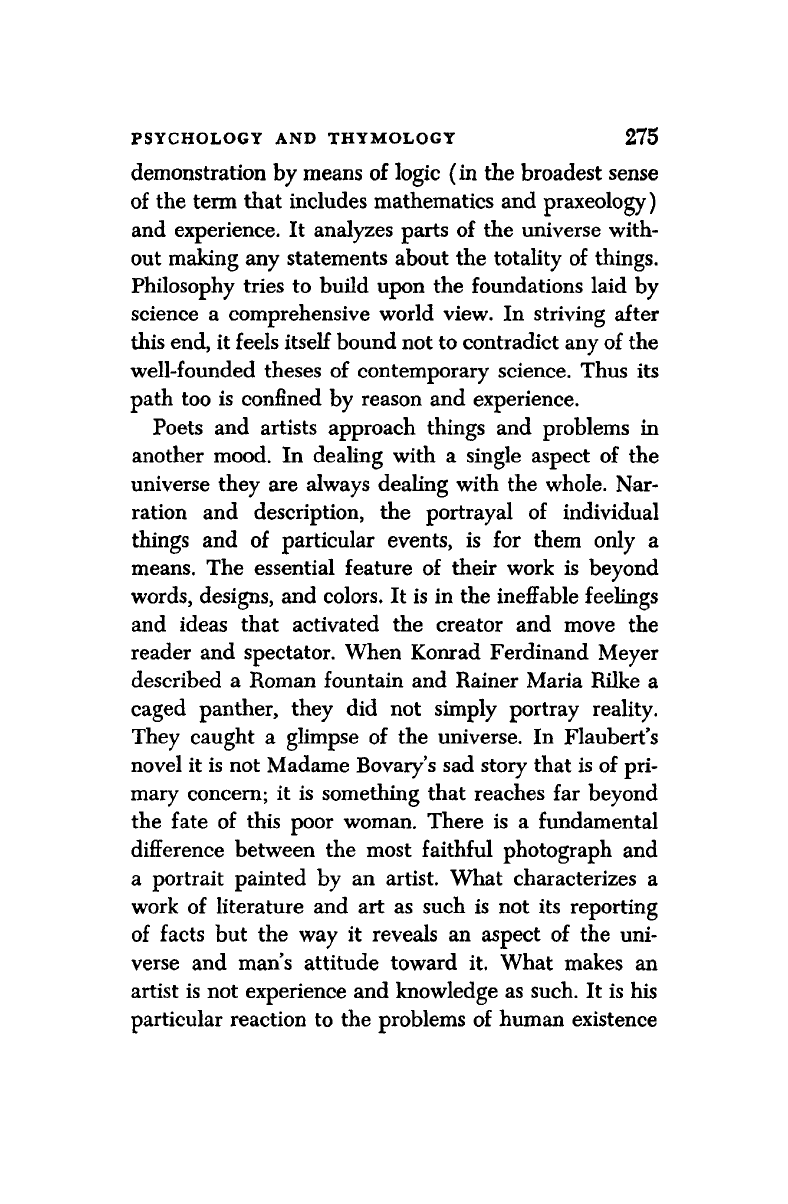
PSYCHOLOGY AND THYMOLOGY 275
demonstration by means of logic (in the broadest sense
of the term that includes mathematics and praxeology)
and experience. It analyzes parts of the universe with-
out making any statements about the totality of things.
Philosophy tries to build upon the foundations laid by
science a comprehensive world view. In striving after
this end, it feels itself bound not to contradict any of the
well-founded theses of contemporary science. Thus its
path too is confined by reason and experience.
Poets and artists approach things and problems in
another mood. In dealing with a single aspect of the
universe they are always dealing with the whole. Nar-
ration and description, the portrayal of individual
things and of particular events, is for them only a
means. The essential feature of their work is beyond
words, designs, and colors. It is in the ineffable feelings
and ideas that activated the creator and move the
reader and spectator. When Konrad Ferdinand Meyer
described a Roman fountain and Rainer Maria Rilke a
caged panther, they did not simply portray reality.
They caught a glimpse of the universe. In Flaubert's
novel it is not Madame Bo vary's sad story that is of pri-
mary concern; it is something that reaches far beyond
the fate of this poor woman. There is a fundamental
difference between the most faithful photograph and
a portrait painted by an artist. What characterizes a
work of literature and art as such is not its reporting
of facts but the way it reveals an aspect of the uni-
verse and man's attitude toward it. What makes an
artist is not experience and knowledge as such. It is his
particular reaction to the problems of human existence
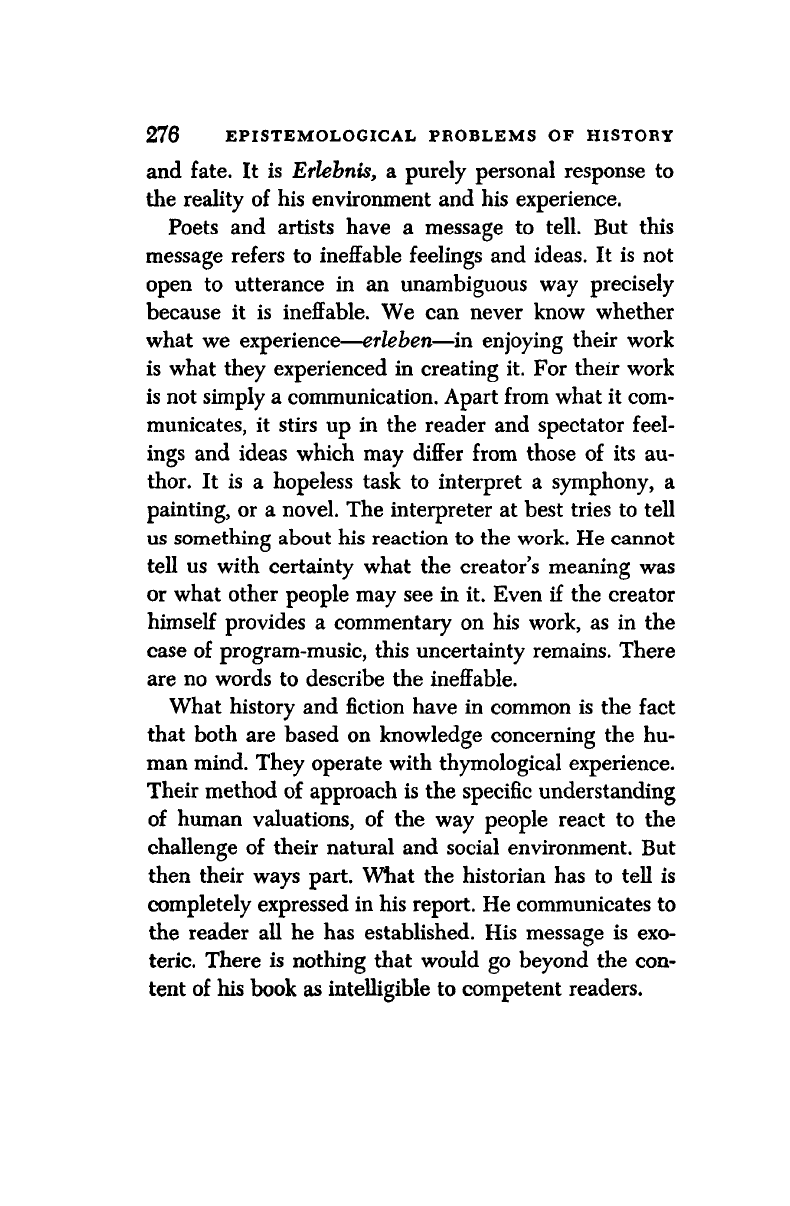
276 EPISTEMOLOGICAL PROBLEMS OF HISTORY
and fate. It is Erlehnis, a purely personal response to
the reality of his environment and his experience.
Poets and artists have a message to tell. But this
message refers to ineffable feelings and ideas. It is not
open to utterance in an unambiguous way precisely
because it is ineffable. We can never know whether
what we experience—erleben—in enjoying their work
is what they experienced in creating it. For their work
is not simply a communication. Apart from what it com-
municates, it stirs up in the reader and spectator feel-
ings and ideas which may differ from those of its au-
thor. It is a hopeless task to interpret a symphony, a
painting, or a novel. The interpreter at best tries to tell
us something about his reaction to the work. He cannot
tell us with certainty what the creator's meaning was
or what other people may see in it. Even if the creator
himself provides a commentary on his work, as in the
case of program-music, this uncertainty remains. There
are no words to describe the ineffable.
What history and fiction have in common is the fact
that both are based on knowledge concerning the hu-
man mind. They operate with thymological experience.
Their method of approach is the specific understanding
of human valuations, of the way people react to the
challenge of their natural and social environment. But
then their ways part. What the historian has to tell is
completely expressed in his report. He communicates to
the reader all he has established. His message is exo-
teric. There is nothing that would go beyond the con-
tent of his book as intelligible to competent readers.
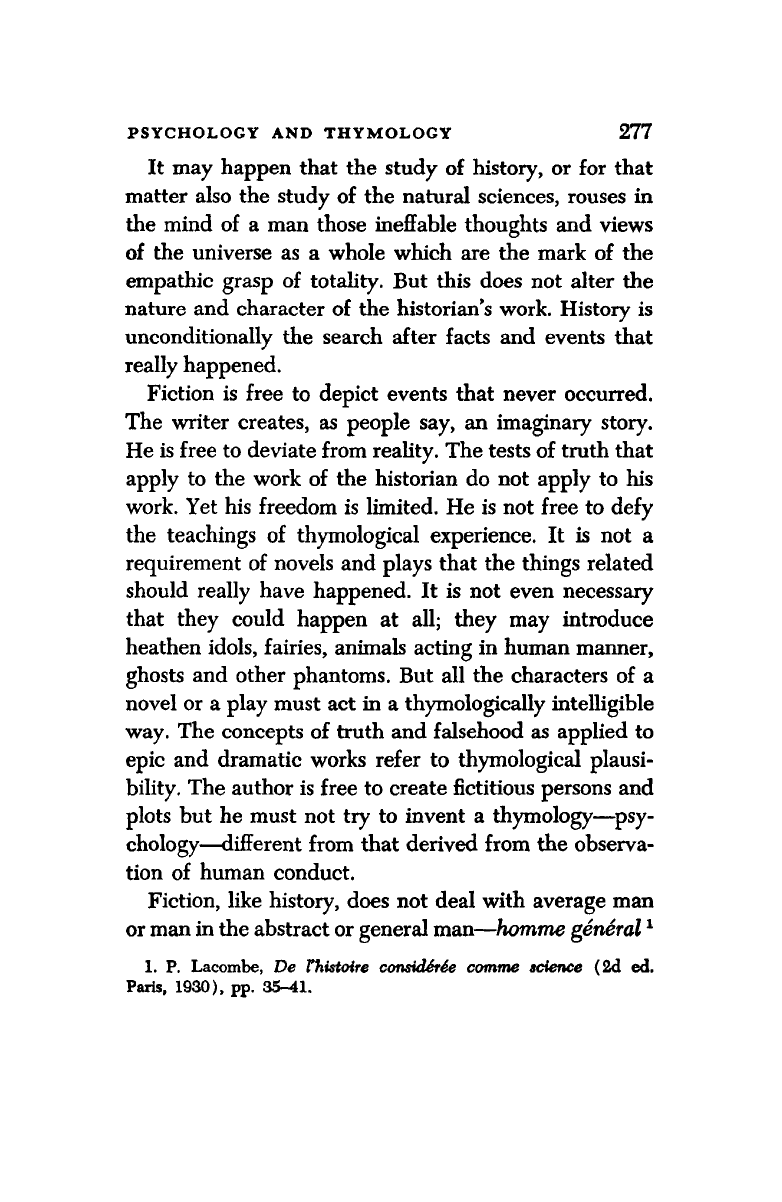
PSYCHOLOGY AND THYMOLOGY 277
It may happen that the study of history, or for that
matter also the study of the natural sciences, rouses in
the mind of a man those ineffable thoughts and views
of the universe as a whole which are the mark of the
empathic grasp of totality. But this does not alter the
nature and character of the historian's work. History is
unconditionally the search after facts and events that
really happened.
Fiction is free to depict events that never occurred.
The writer creates, as people say, an imaginary story.
He is free to deviate from reality. The tests of truth that
apply to the work of the historian do not apply to his
work. Yet his freedom is limited. He is not free to defy
the teachings of thymological experience. It is not a
requirement of novels and plays that the things related
should really have happened. It is not even necessary
that they could happen at all; they may introduce
heathen idols, fairies, animals acting in human manner,
ghosts and other phantoms. But all the characters of a
novel or a play must act in a thymologically intelligible
way. The concepts of truth and falsehood as applied to
epic and dramatic works refer to thymological plausi-
bility. The author is free to create fictitious persons and
plots but he must not try to invent a thymology—psy-
chology—different from that derived from the observa-
tion of human conduct.
Fiction, like history, does not deal with average man
or man in the abstract or general man—homme general
x
1.
P. Lacombe, De Vhistoire consideWie comme science (2d ed.
Paris,
1930), pp.
35-41.
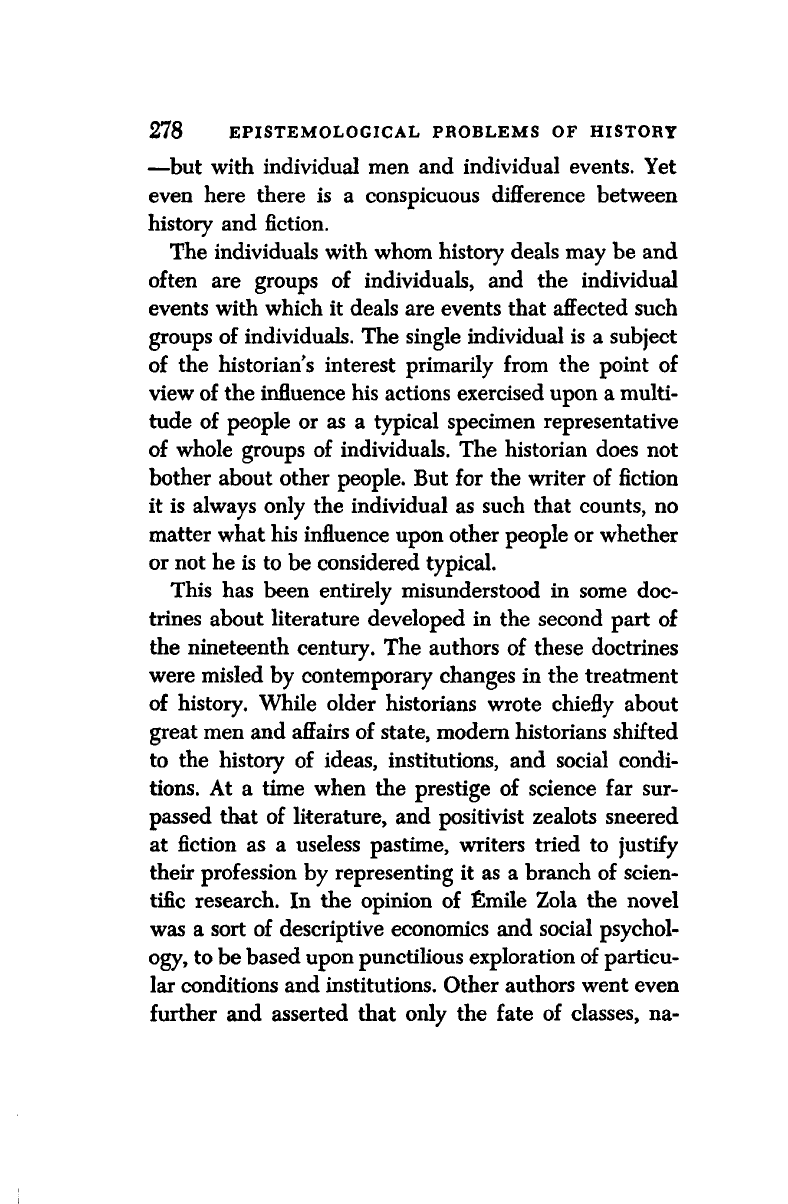
278 EPISTEMOLOGICAL PROBLEMS OF HISTORY
—but with individual men and individual events. Yet
even here there is a conspicuous difference between
history and fiction.
The individuals with whom history deals may be and
often are groups of individuals, and the individual
events with which it deals are events that affected such
groups of individuals. The single individual is a subject
of the historian's interest primarily from the point of
view of the influence his actions exercised upon a multi-
tude of people or as a typical specimen representative
of whole groups of individuals. The historian does not
bother about other people. But for the writer of fiction
it is always only the individual as such that counts, no
matter what his influence upon other people or whether
or not he is to be considered typical.
This has been entirely misunderstood in some doc-
trines about literature developed in the second part of
the nineteenth century. The authors of these doctrines
were misled by contemporary changes in the treatment
of history. While older historians wrote chiefly about
great men and affairs of state, modern historians shifted
to the history of ideas, institutions, and social condi-
tions.
At a time when the prestige of science far sur-
passed that of literature, and positivist zealots sneered
at fiction as a useless pastime, writers tried to justify
their profession by representing it as a branch of scien-
tific research. In the opinion of fimile Zola the novel
was a sort of descriptive economics and social psychol-
ogy, to be based upon punctilious exploration of particu-
lar conditions and institutions. Other authors went even
further and asserted that only the fate of classes, na-
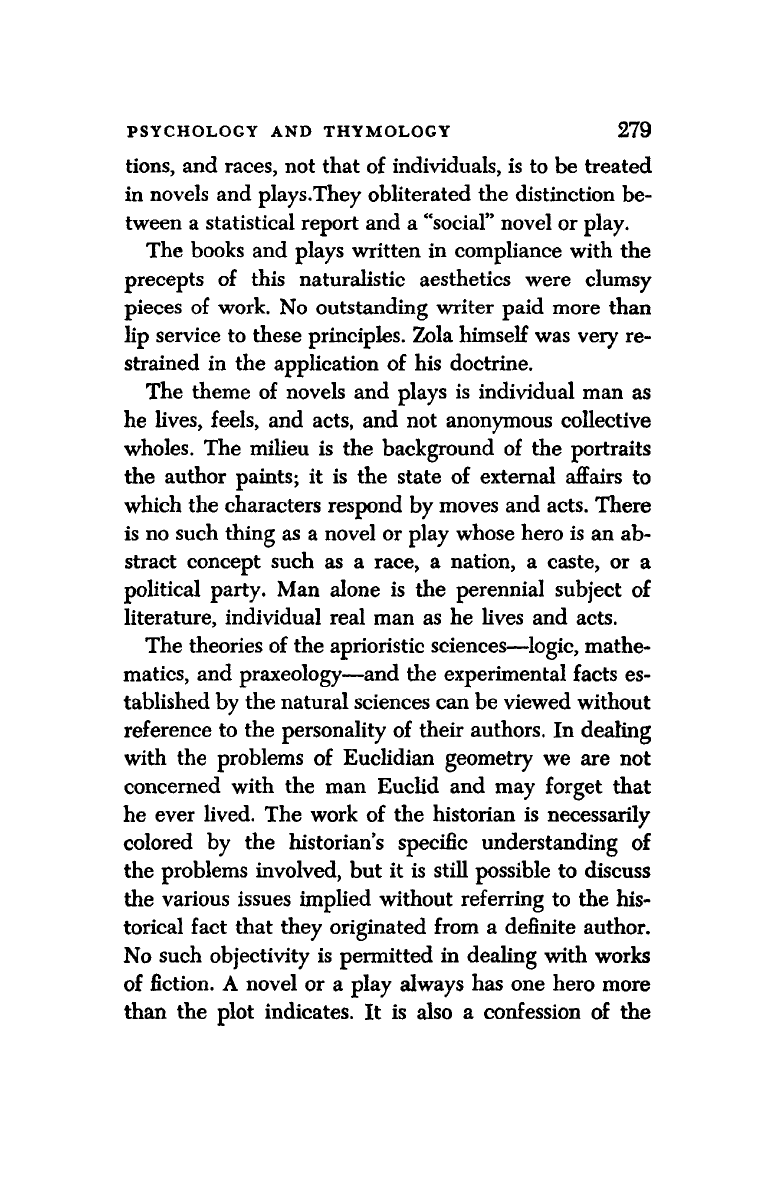
PSYCHOLOGY AND THYMOLOGY 279
tions,
and races, not that of individuals, is to be treated
in novels and plays.They obliterated the distinction be-
tween a statistical report and a "social" novel or play.
The books and plays written in compliance with the
precepts of this naturalistic aesthetics were clumsy
pieces of work. No outstanding writer paid more than
lip service to these principles. Zola himself was very re-
strained in the application of his doctrine.
The theme of novels and plays is individual man as
he lives, feels, and acts, and not anonymous collective
wholes. The milieu is the background of the portraits
the author paints; it is the state of external affairs to
which the characters respond by moves and acts. There
is no such thing as a novel or play whose hero is an ab-
stract concept such as a race, a nation, a caste, or a
political party. Man alone is the perennial subject of
literature, individual real man as he lives and acts.
The theories of the aprioristic sciences—logic, mathe-
matics, and praxeology—and the experimental facts es-
tablished by the natural sciences can be viewed without
reference to the personality of their authors. In dealing
with the problems of Euclidian geometry we are not
concerned with the man Euclid and may forget that
he ever lived. The work of the historian is necessarily
colored by the historian's specific understanding of
the problems involved, but it is still possible to discuss
the various issues implied without referring to the his-
torical fact that they originated from a definite author.
No such objectivity is permitted in dealing with works
of fiction. A novel or a play always has one hero more
than the plot indicates. It is also a confession of the
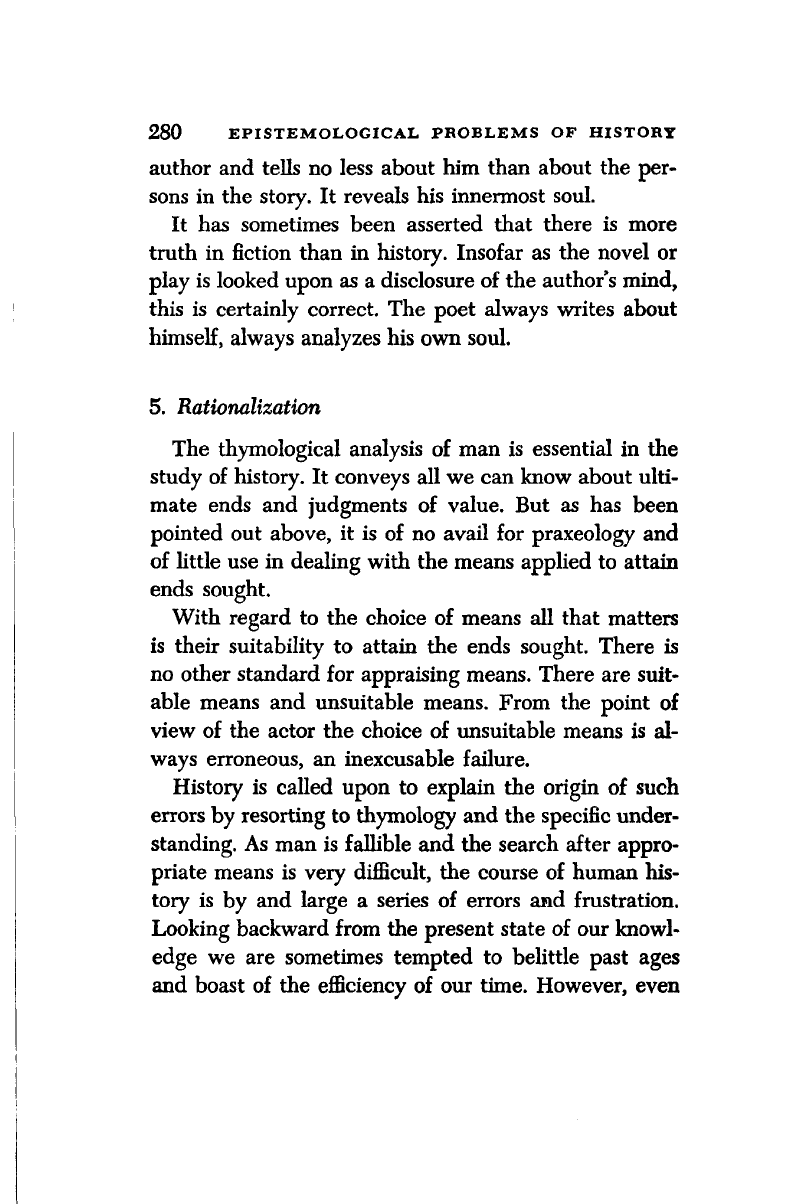
280 EPISTEMOLOGICAL PROBLEMS OF HISTORY
author and tells no less about him than about the per-
sons
in
the story.
It
reveals his innermost soul.
It
has
sometimes been asserted that there
is
more
truth
in
fiction than
in
history. Insofar
as
the novel
or
play is looked upon as a disclosure
of
the author's mind,
this
is
certainly correct. The poet always writes about
himself, always analyzes his own soul.
5. Rationalization
The thymological analysis
of
man
is
essential
in
the
study
of
history. It conveys all we can know about ulti-
mate ends and judgments
of
value.
But as has
been
pointed out above,
it is of
no avail for praxeology and
of little use in dealing with the means applied to attain
ends sought.
With regard
to
the choice
of
means
all
that matters
is their suitability
to
attain
the
ends sought. There
is
no other standard for appraising means. There are suit-
able means and unsuitable means. From
the
point
of
view
of
the actor the choice
of
unsuitable means
is al-
ways erroneous,
an
inexcusable failure.
History
is
called upon
to
explain
the
origin
of
such
errors by resorting to thymology and the specific under-
standing. As man is fallible and the search after appro-
priate means
is
very difficult, the course
of
human his-
tory
is by
and large
a
series
of
errors and frustration.
Looking backward from the present state
of
our knowl-
edge
we are
sometimes tempted
to
belittle past ages
and boast
of
the efficiency
of
our time. However, even
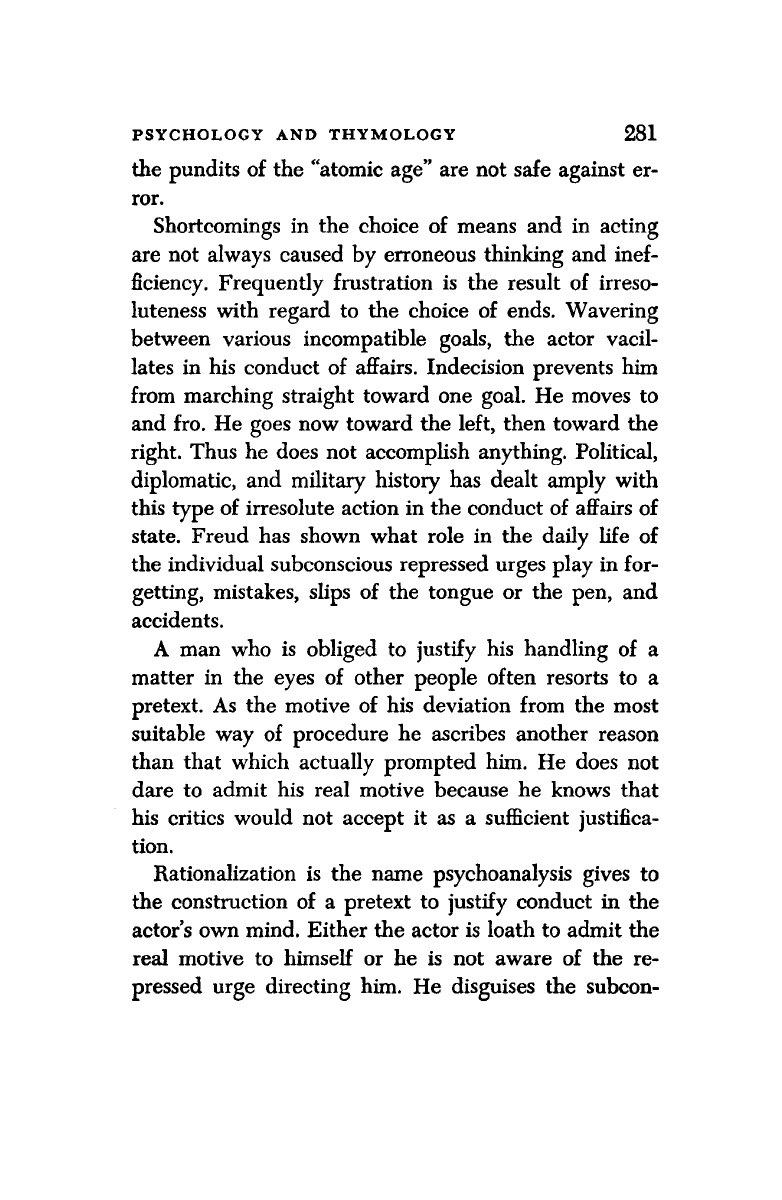
PSYCHOLOGY AND THYMOLOGY 281
the pundits of the "atomic age" are not safe against er-
ror.
Shortcomings in the choice of means and in acting
are not always caused by erroneous thinking and
inef-
ficiency. Frequently frustration is the result of irreso-
luteness with regard to the choice of ends. Wavering
between various incompatible goals, the actor vacil-
lates in his conduct of affairs. Indecision prevents him
from marching straight toward one goal. He moves to
and fro. He goes now toward the left, then toward the
right. Thus he does not accomplish anything. Political,
diplomatic, and military history has dealt amply with
this type of irresolute action in the conduct of affairs of
state. Freud has shown what role in the daily life of
the individual subconscious repressed urges play in for-
getting, mistakes, slips of the tongue or the pen, and
accidents.
A man who is obliged to justify his handling of a
matter in the eyes of other people often resorts to a
pretext. As the motive of his deviation from the most
suitable way of procedure he ascribes another reason
than that which actually prompted him. He does not
dare to admit his real motive because he knows that
his critics would not accept it as a sufficient justifica-
tion.
Rationalization is the name psychoanalysis gives to
the construction of a pretext to justify conduct in the
actor's own mind. Either the actor is loath to admit the
real motive to himself or he is not aware of the re-
pressed urge directing him. He disguises the subcon-
